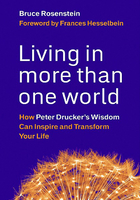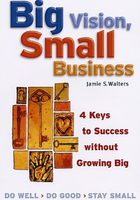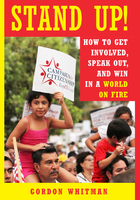PART 1 WHY WE MUST FIGHT
How and Why We Have Limited the Duration, Volume, and Location of Speech
I rise on behalf of the vast majority of the American people who believe money is not speech, corporations are not people, and government should not be for sale to the highest bidder. We demand that you overturn Citizens United.
-Kai Newkirk, addressing the Supreme Court, which promptly shut him up
The Supreme Court had never seen anything like it. On February 26, 2014, a young man in the audience stood up and had the temerity to speak his mind to all nine justices. The Court bailiffs promptly arrested Kai Newkirk-they silenced his speech so that other people could be heard. And they were right to do so.
The Supreme Court strictly regulates who is allowed to speak before the Court and how they must do it. It's not enough to be a lawyer. An attorney must be recognized as a special member of the bar of the Supreme Court of the United States. Attorneys must be nominated by another member of the bar and confirmed by the Court itself before they can utter a single word. Regular citizens are forbidden to speak.
Kai Newkirk was breaking all the Court's rules. He wasn't a lawyer and he wasn't representing anyone in the lawsuit before the Court. He was a visitor in the audience, which had been explicitly told it could not speak during the proceedings. Further, somebody videotaped Kai's speech and put it on the Internet-the first such incident in the history of a secretive chamber that prohibits any video recording of its proceedings.
Although court bailiffs were right to enforce the rules limiting speech in the Supreme Court chambers, Kai was surely right to speak out against the tyranny of a court that refuses to limit the paid speech of billionaires while telling Kai and the rest of us to shut up. In the Citizens United case, and many others, the Supreme Court has mistakenly held that limiting the money people and organizations can spend to purchase speech violates the First Amendment. In fact, our everyday experiences demonstrate that limiting each person's speech is necessary to ensure a full and free public debate. Let's consider some examples of how and why this is done.
Why We Limit the Duration of Speech
Courts impose strict page limits on the briefs that lawyers submit prior to hearings. Just ask the multinational oil company BP (formerly British Petroleum). During litigation surrounding its unprecedented oil spill in the Gulf of Mexico in 2010, the company submitted a brief that appeared to be within the thirty-five-page limit set by the court. However, district court judge Carl Barbier noticed that the company had slightly adjusted the spacing between lines to squeeze in the equivalent of six more pages than what was allowed. Judge Barbier warned that if BP continued such tactics, he would strike all future briefs from the company, saying "The Court should not have to waste its time policing such simple rules.…Counsel are expected to follow the Court's orders both in letter and in spirit."[20] If courts can limit corporate speech defending itself in litigation, why can't we limit corporate spending on elections that only indirectly affect corporate interests?
It is not just the city council in Richmond, California, or federal courts that limit how long a person can speak. We limit speech all the time. Turn on C-SPAN and you'll notice members of Congress pay close attention to just how much time they have to speak on the floor. They'll often ask the chairperson to allocate more time, or "yield back" the balance of their time to other members to speak. But if they exceed their time limit, the chairperson's gavel comes down, limiting their speech so that others may be heard. Similarly, during a debate for any office, from president down to state legislator, there are strict rules limiting the amount of time each candidate has for opening remarks and to answer each question.
Nobody seriously believes that these limits on the duration of certain political speech violate the First Amendment, which says that Congress shall not abridge the people's right to freedom of speech. In fact, these limits protect the First Amendment by ensuring that the people, and our representatives in Congress, can hear from opposing points of view and make informed decisions about self-government.
Why We Limit the Timing of Speech
My first summer job during college was going door-to-door on behalf of a grassroots campaign for an environmental organization. Police sometimes picked up canvassers on our team, telling them that door-to-door solicitation wasn't allowed in a particular community. It turns out they were wrong. Although courts have upheld bans on door-to-door solicitation for commercial purposes (such as the famed Fuller Brush man of long ago who knocked on doors selling cleaning supplies), the Supreme Court has specifically rejected bans on door-to-door solicitation for political speech.[21] Similarly, courts have upheld so-called "do not call" lists for commercial telemarketing even while allowing political campaigns to call voters uninvited. However, courts have upheld limits on the hours that you are allowed to knock on a person's door or call him on the phone-in many cities this is banned after nine o'clock at night. That limit on speech is justified because it balances the listener's right to privacy in his own home with your right to speak.
We also limit the timing of speech in public spaces. Just ask the activists of Occupy Wall Street. After holding signs and chanting "we…are…the 99 percent" for hours, the protesters decided to sleep in Zuccotti Park near Wall Street rather than heading home to the comfort of their beds. Other protesters joined them in solidarity in similar demonstrations across the country.
Months into the protests, police fell back on curfews as justification to storm the public parks and eject protesters using tear gas and sometimes violence. Thousands were jailed. In this way, police limited the duration of the protesters' speech by acting against alleged violations of the timing of that speech (in the form of curfews). This approach perhaps would have been reasonable if there were other people who wanted to use those same public spaces to speak about other issues, or even to simply enjoy some silence. But in this case, it's not clear that the protesters were preventing anyone else from speaking or disturbing the peace enough to lose their right to free speech, and the crackdowns were widely condemned.
How I Was Arrested for Speaking Too Much
In the summer of 2014, I joined Kai Newkirk and hundreds of others during the final day of a march on the California state capitol. Kai and others in the group 99Rise walked all the way from Los Angeles to Sacramento over thirty-seven days, enduring temperatures as high as 110 degrees in California's Central Valley.
March organizers had acquired a permit to protest on the steps of the capitol. But we wanted to continue our protest for longer than the permit allowed-long enough so that legislators would hear us when they came to their offices the following morning.
At 10:30 that evening, police informed us that our permit to protest had "expired"-as if there is an expiration date in the First Amendment. When we didn't leave, we were arrested, handcuffed, and taken to the county jail. The government had decided to limit the duration of our speech. It shut us up.
Had there been four other groups of people wanting to speak on the steps of the California state capitol at 10:30 that evening, then limiting our speech would have promoted First Amendment values. There are four sets of steps to the capitol-one on the east, west, north, and south. Occasionally, there are times when different groups are actually using each set of steps for a protest, press conference, concert, wedding, or other event. During those times, government permits enhance the ability of people to speak by ensuring that every group has a chance to use the limited forum of the capitol steps. The permits also prevent hecklers and other saboteurs from hijacking another group's event.
But if government limits on one person's speech are not enacted specifically to allow another person to speak, the limits don't further the First Amendment. Perhaps that is why the prosecutor declined to bring charges against me and the twelve other protesters who were detained that night.
This concept-that limitations on speech promote the aims of the First Amendment if they enhance the ability of other people to speak-is the core lesson we must apply to money in politics. The refusal to apply this simple principle is the Supreme Court's key failing.
Why We Limit the Volume of Speech
Besides limiting the duration and timing of speech, government also limits how loud we can be. In many states, it is illegal to drive a motorcycle that exceeds ninety-two decibels, even if the motorcycle is part of a political parade.[22] Some cities have ordinances that regulate amplified sound, even if it is coming from a political sound truck.[23] Your neighbors simply don't want to hear your views about abortion, war, or the minimum wage blasted at the volume of a rock-and-roll concert.
"This concept-that limitations on speech promote the aims of the First Amendment if they enhance the ability of other people to speak-is the core lesson we must apply to money in politics."
Police can arrest people for speaking too noisily. A dozen people from the Christ Fellowship Church were arrested for protesting too loudly outside a fund-raiser for a pro-gay marriage organization in North Carolina. Police claimed that the protesters were violating the city of Greensboro's noise ordinance.[24] If there were no limits on noise, anyone could silence speech they opposed by simply outshouting the speaker.
In addition to noise ordinances, most jurisdictions authorize police to arrest citizens for "disturbing the peace." Although this can be done for legitimate purposes, it can also quite literally mean that the government can shut you up when it thinks you should be quiet and peaceful. During protests across the United States in the wake of several police killings of unarmed African Americans in Ferguson, Missouri, and elsewhere, thousands of people were arrested for "disturbing the peace" because they were disrupting the normal flow of life in an attempt to make their views known.[25]
Police can and do silence protesters when they block traffic on highways or sidewalks, disturb shoppers, or otherwise make too much of a nuisance of themselves. Why? Because when one constitutional right conflicts with another right or interferes with our ability to govern ourselves, there's a legitimate reason to enforce limits. The principle at stake in the examples above is that one person's right to use her property (be it a motorcycle, a loudspeaker, or a protest sign) cannot violate another person's right to enjoy quiet on his own property or to drive down a highway unimpeded by protesters. When your freedoms trample on my liberties, we need to balance rights-including those espoused in the First Amendment.
Why We Limit the Location of Speech
Once when I was working on a campaign to increase recycling rates, some of the volunteers thought we should hold a large banner on a freeway overpass. Thousands of cars that drove below us would then see our message.
The highway patrol told us this was unsafe because motorists might be distracted by our political speech and could get into an accident. The government was limiting the location of our speech in order to protect the safety of motorists. That's a reasonable balance between First Amendment rights to free speech and the constitutional duty of government to promote the general welfare. It would be even more reasonable-and credible-if the government applied the same logic to billboards. Had the volunteers on my campaign been able to raise tens of thousands of dollars, we could have put the exact same banner on a billboard that the same motorists would have seen in a way that the highway patrol didn't view as distracting.
When more than ten thousand Tea Party activists descended on Washington, DC, in 2009 to protest the Affordable Care Act, ten of them were arrested for protesting inside the Capitol building. The police considered the protests "disorderly conduct" and quite literally silenced those protesters even while allowing many more to say the exact same thing outside the building.[26] Again it was the location, not the content, of the speech that the government was limiting.
Courts have similarly upheld limits on the location of speech outside polling places or abortion clinics. There is a legitimate question as to whether fifty feet, or five hundred feet, or five thousand feet is an appropriate balance between the free speech ideals of the First Amendment and the privacy rights of someone casting a vote or making an important decision without being harassed by someone screaming just inches away from her face. The challenge here is not whether there should be any limit on the speech, but what the limit should be.
Should We Ever Limit the Content of Speech?
Government rules on where we speak, when we speak, and how loudly we speak are less troubling than limits on what we say. Any regulation on the content of speech runs a great risk of limiting freedom of conscience and violating the First Amendment. But even when it comes to content regulation, many Americans agree some limits are justified.
Our government prohibits people from speaking about classified information that protects national security, for example. It is illegal to tell a foreign government, a terrorist organization, or even the general public information that could jeopardize the lives of Americans. Bradley Manning was sent to prison for revealing secret video footage that showed, among other things, US troop movements in Iraq.
Nonetheless, it is dangerous to allow the executive branch alone to decide what is secret and what is not. There is a difference between treason and legitimate whistleblowing or political dissent that presidents and their inner circle of advisors may not see in the fog of war. It is far too tempting for the government to label serious political opposition as jeopardizing national security. For instance, the administration of President Barack Obama attempted to ban the release of videos showing force-feeding of prisoners at the Guantanamo Bay detention facility, arguing it would harm national security because enemies of the United States might use the footage for propaganda. A judge disagreed with the notion that propaganda was a legitimate security threat and rejected the government's limit on the content of this speech.[27]
One of the reasons we need a judicial branch is to check the power of the executive branch. When President Richard Nixon tried to prosecute Daniel Ellsberg for leaking the Pentagon Papers during the Vietnam War, a judge ultimately refused to convict Mr. Ellsberg. Ellsberg had violated government limits on his speech by giving classified documents to the New York Times for publication. But the judicial branch concluded that those restrictions were not justified by our national security interests. A jury might, or might not, come to a similar conclusion about Edward Snowden if he is ever brought to trial for violating limits on speaking about the National Security Agency's warrantless surveillance of American communications.
Some people believe there should be no government secrets. Projects such as WikiLeaks intentionally violate government limits on speech by leaking classified information to the news media and to citizens directly. But even WikiLeaks founder Julian Assange concedes that some information should be kept secret; he just believes that secrecy shouldn't be used to cover up government abuses.[28]
Whether or not you agree with Assange or Snowden, most Americans believe that at least some information should be classified. How to decide what types of speech to limit for national security purposes and what to make public is an important debate that is beyond the scope of this book. Nonetheless, even those citizens who think there should be absolutely no limits on the content of speech should think seriously about distinguishing that issue from whether we should limit the duration, timing, and location of speech-let alone the amount that billionaires may spend on political advertising. Similarly, we should separate the issue of regulating content of speech from limiting the amount of money that any person or group can spend to promote that speech in a political campaign.[29]
How Much Can One Person Hear?
Beyond legal limits on location, duration, volume, and even content of speech, the combination of our growing population and the information explosion of the past few decades has created an even more significant limit on everyone's speech-the limit on how much information each listener can absorb.
It is simply impossible for the president to listen to each and every one of the 320 million residents of the United States. A single member of Congress could not listen to everything that every constituent wanted to say, even if she spent all day doing nothing else. So, who will they listen to?
Here's how former senator Paul Simon put it: "In my last campaign, I spent $8.4 million running for reelection. It has a corrupting influence on all of us." Simon went on to explain what happens when he arrives at a hotel at midnight and finds twenty messages waiting for him, with nineteen from people he doesn't recognize and one from someone who has given him a $1,000 campaign contribution: "At midnight, I'm not going to make twenty phone calls. I might make one. Which one do you think I'm going to make?"[30]
Senator Bill Bradley was even more blunt: "Money not only determines who is elected, it determines who runs for office. Ultimately, it determines what government accomplishes-or fails to accomplish. Under the current system, Congress, except in unusual moments, will inevitably listen to the 900,000 Americans who give $200 or more to their campaigns ahead of the 259,600,000 who don't."[31]
Similarly, a voter does not have enough hours in the day to listen to everyone's opinions of how he should vote. Even if none of the government-imposed limits on time, place, and duration of speech existed, the real world imposes limits on how much any person can hear.
Yet if we want to govern ourselves thoughtfully and effectively, we need to hear various and opposing viewpoints about public policy options. So the question becomes: How do we decide which speech to listen to? And perhaps more importantly, who will choose?
Self-Government in an Age of Information Overload
At the founding of the United States, and indeed throughout most of world history, information was scarce. It simply wasn't possible to bombard citizens with more information than they could absorb. Limited technology, dispersed populations, and low literacy rates prevented the type of information overload we experience today.
In contrast, today's New York Times contains more information in a single issue than an ordinary citizen of the seventeenth century encountered during his entire lifetime.[32] Researchers estimate the average American consumes twelve hours of information a day.[33] This double-counts hours spent multitasking, such as checking e-mail while also listening to the news on television, but nonetheless the researchers estimate that we spend three-quarters of our waking time at home consuming some form of information. Yet try as we might, we can't come close to listening to everything that everyone has to say.
Behavioral scientists believe the average human brain can retain five to seven items in short-term memory.[34] Each additional piece of information above that physical limit quite literally displaces another piece of information in our brain. Speech competing for our attention, therefore, approaches a zero-sum game.
Marketing experts know that advertisements from one product, or one entire market sector, can crowd out advertisements for other products and sectors.[35] After a certain point, our brains become saturated and we start tuning out new ads for similar items.
Cognitive psychologist Herbert Simon tells us that
in an information-rich world, the wealth of information means a dearth of something else: a scarcity of whatever it is that information consumes. What information consumes is rather obvious: it consumes the attention of its recipients. Hence a wealth of information creates a poverty of attention and a need to allocate that attention efficiently among the overabundance of information sources that might consume it.[36]
To deal with information overload, we limit what we pay attention to, including political speech.
When Less Is More: An Abundance of Limited Speech
This concept-that strict limits on speech enable more people to be heard-is the essence of the social networking service Twitter. By limiting each message to 140 characters, Twitter not only forces speakers to be concise but also allows listeners to follow the speech of hundreds, even thousands of fellow citizens.
Information sources recognized the need to limit speech long before the Internet age. Most newspapers impose strict word limits on letters to the editor, opinion columns, and even news stories by reporters. Just as there is only so much information that can fit in a person's brain, there is only so much news and opinion that can fit in a newspaper. In choosing which letters to print, opinion columns to carry, and news stories to cover, editors serve as information filters. They help readers decide which information is worth their time and which is not.
Because decisions about what speech to include involve political judgment, indeed a bias, it is important for readers to select news providers that they trust to limit speech in an appropriate and responsible manner. Self-government is best served when a citizen is exposed to differing political viewpoints, so most mainstream news editors provide an array of opposing views within one broad publication. Others provide information primarily from one political viewpoint. Both approaches are important and legitimate. What matters most is that readers know the biases, and ownership, of news outlets and can choose from a broad diversity of different news sources.
Social media, blogs, and the explosion of other online information sources have made it easier for citizens to create their own information filters. With Twitter and Facebook, you can decide who to "follow" and with blogs, you can choose which to read-you are not at the mercy of an editor. This opportunity to be our own editors offers incredible potential to expand political dialogue and engagement and reduce the concerns about powerful media conglomerates controlling which speech is heard and which is silenced.
Information expert Clay Shirky has noted that technology has already given us the tools we need to deal with the challenges of our information society. "There's no such thing as information overload," Shirky notes, "only filter failure."[37] The ability to have filters with integrity has become key to our success as a nation.
Advertisements (which I'll explore as paid speech in the next chapter) cause filter failure. Advertisers selling products and services have information and opinions that no news editor would deem worthy of news coverage, so those advertisers pay the newspaper to run an ad. Advertisers who want to speak to people who are not following them on Twitter or Facebook can pay those companies a fee to have "sponsored" tweets or posts interrupt the information "feed" that the user has chosen to receive.
Advertising, by design, corrupts and distorts our marketplace of ideas-our chosen limits on speech. It takes the decision about which speech to include out of the hands of an editor (who the reader entrusts to play that role) and puts it into the hands of whoever has money to pay for it. Because we all have limited capacity to absorb speech, an advertiser not only pays to promote its own message but also to displace other speech that the listener might have listened to instead. Advertisements shut you up by drowning you out.
What you can do: Write the editor
Submit a brief letter to the editor of your local newspaper calling upon Congress to overturn the Citizens United ruling with a constitutional amendment. If they don't print it, get five friends to submit similar letters and see if one of you can break through the editor's filter.















